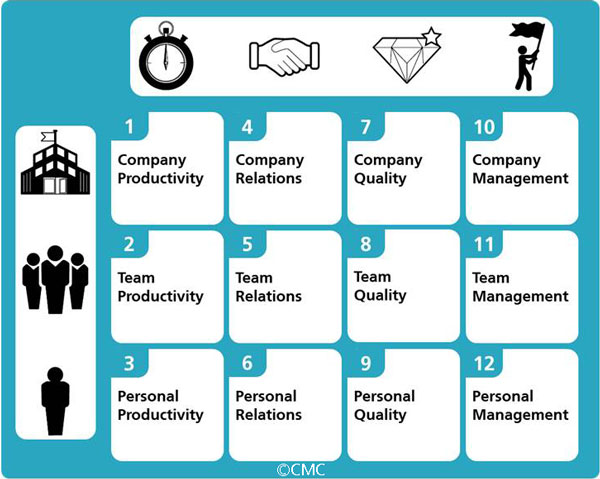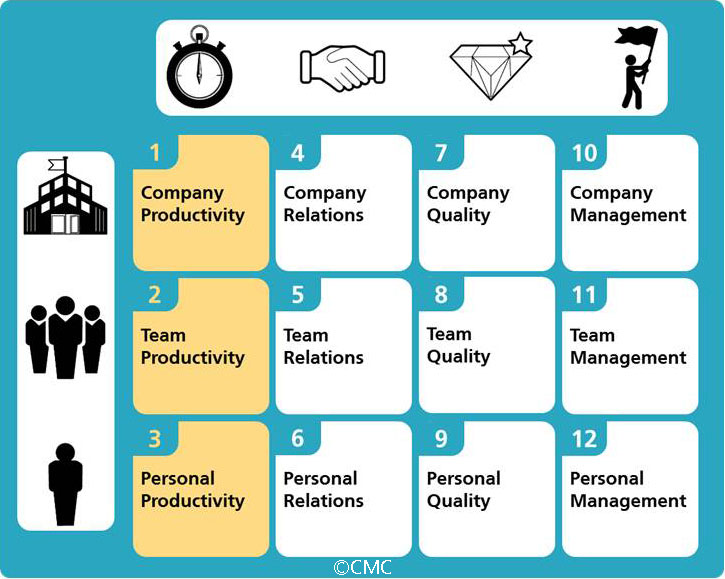Productivity Business Excellence (PBE)

PRODUCTIVITY is not a management fad but an evergreen concept essential for the survival and growth of any business.
Productivity means adding value in all activities performed at all levels in the organisation.
Productivity is about:
- ensuring that all activities in the organization are worthwhile and produce more value than costs
- setting goals and achieving them with an optimal use of resources
- aligning all efforts and making everyone pull in the same direction to meet the team and company goals
- efficiency and effectiveness
- managing the resources:
- TIME
- KNOWLEDGE
- MONEY
Claus Møller’s Productivity Management Concept may be seen as an umbrella comprising other productivity related concepts like:
- Time Management
- Project Management
- Management by Objectives (MBO)
- Knowledge Management
- Business Process Reengineering (BPR)
Excellent productivity implies good relations and high quality – and vice versa.
Excellent productivity requires good relations between:
- Management and staff
- Team members in each team
- All teams in the company
- The company and its external stakeholders
Poor productivity damages relationships.
Lack of desired results often leads to negative emotions, moods and reactions: frustration, blame, bad excuses, apathy, conflicts or internal wars.
Excellent productivity promotes quality and excellent quality promotes productivity. Poor productivity impedes quality. Inefficiency leads to sloppy work, mistakes, waiting time and delays – damaging the quality image of the company, its people and products.
The Productivity Process

The 3 productivity windows in the General Business Excellence model (1, 2 and 3) represent the Productivity Behaviour that any company needs to exercise to achieve goals with an optimal use of all its resources.
When Productivity Behaviour is exercised at all 3 levels at the same time and everyone’s goals and activities are aligned, the company has established a Productivity Process. This process is one of the four vital business processes to be established and maintained in any business.
The Productivity Process functions when everyone:
- is managing their time, energy and knowledge in the interest of their company
- focus on value adding activities leading to personal, team and company results
- strives to make the company’s overall dream or vision come true
Claus Møller calls the productivity process VISION DEPLOYMENT. The vision deployment process aligns goals and activities at 3 levels.
The challenge for any company is to inspire all employees to contribute to a successful implementation of the Vision Deployment Process.
Vision Deployment represents one approach to a Strategic Planning Process: From vision to reality.
In a Vision Deployment Process, the vision and the strategic goals of the company are defined and broken down into goals and activities for each team and each individual.
The Vision Deployment Process aligns goals and activities at three levels. It also includes an analysis of the work habits and processes at all three levels and a programme to monitor them and make them efficient and effective to ensure goal attainment.
Productivity challenges in organisations
The findings from the Energy Meter surveys in connection with the Employeeship seminars conducted for companies in all business, all over the world, reveal that productivity together with implementation represent the weakest elements in many organisations.
One of the biggest productivity and implementation challenges in organisations is that many people spend the majority of their time “fire-fighting”. This results in stress, quality problems, fatigue, ineffectiveness and inefficiency. It also means that people are driven by urgency rather than importance. The most important tasks (the ones that lead you to the goals) are postponed or not done at all, promises and deadlines are not kept, initiatives/projects are not finished.
What companies gain from managing the productivity process
Adopting the PBE Model can help companies, teams and individuals achieve their goals with an optimal use of resources.
What companies gain from managing the productivity process
Improved bottom line results through
- Making a real vision
- Establishing strategic goals to make the vision come true
- Breaking down the strategic goals into goals for all teams and individuals
- Giving clear direction and creating meaningful work for everyone
- Making sure that everyone understands their role and what is expected from them
- Making everyone see their work in a greater context
- Making everyone focus on the things that matter
- Making activity plans for everyone coherent with the vision and goals
- Aligning all activities to maximise performance at all levels
What teams gain from managing the productivity process
Better team results through:
- Making a vision for the team
- Establishing strategic team goals to make the vision come true
- Breaking down the strategic goals into goals for all teams’ members
- Giving clear direction and creating meaningful work for everyone
- Making sure that everyone understands their role and what is expected from them
- Making everyone see their work in a greater context
- Making everyone focus on the things that matter
- Making activity plans for everyone coherent with the team goals
- Aligning all activities to maximise team performance
What individuals gain from managing their personal productivity
- Better personal results
- Better work/life balance
- Better overview and control of their life
- More energy and time for creativity
- Less negative stress
- Better career opportunities
- Employability
- Better use of their personal potential
Claus Møller is many times awarded management consultant of numerous organizations – IBM, American Express, the European Commission, IKEA, McDonald’s, Shell, Audi/Volkswagen … – and the author of several best-selling books and articles from the areas of management, communications, productivity and human behaviour.

